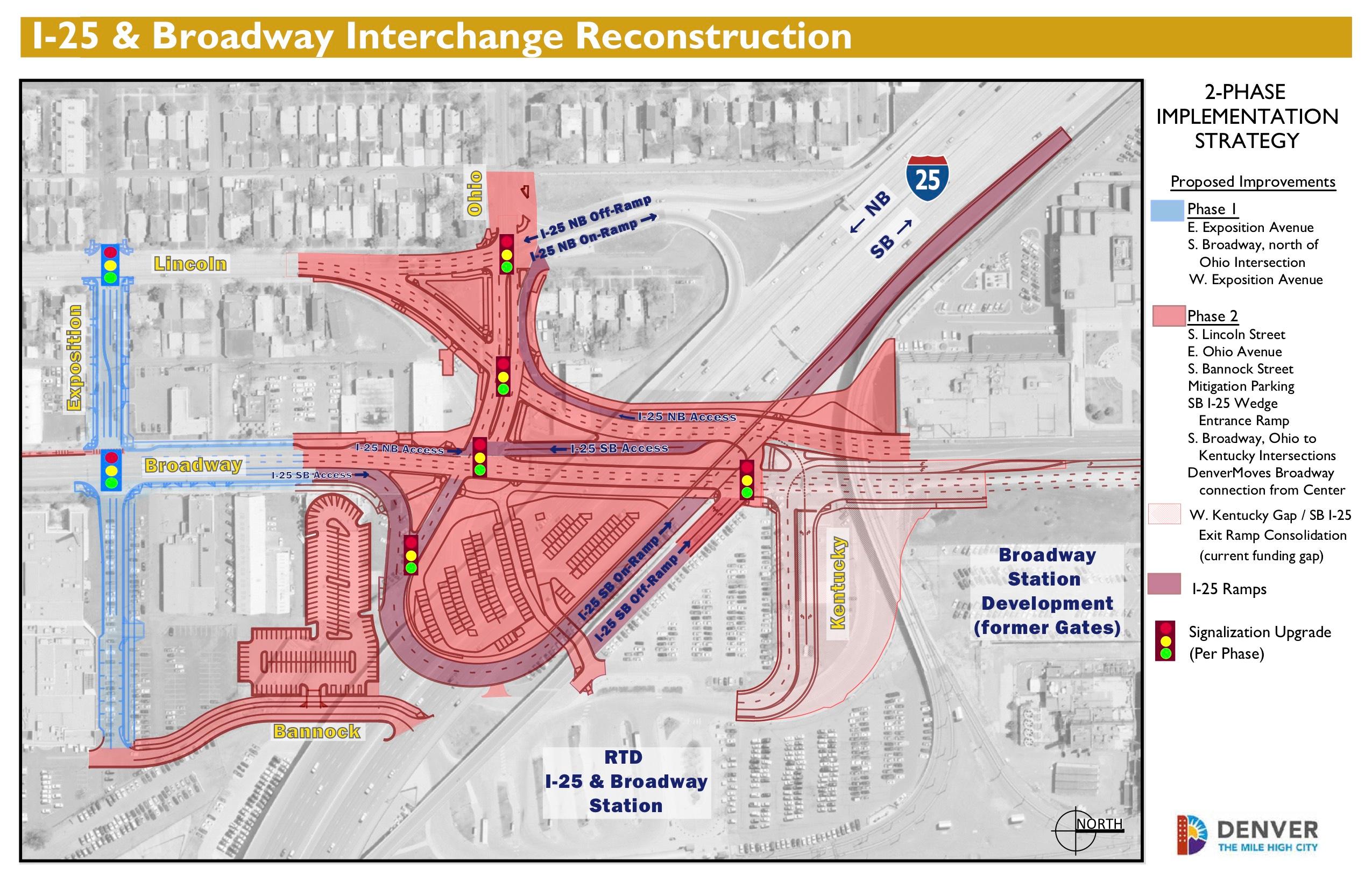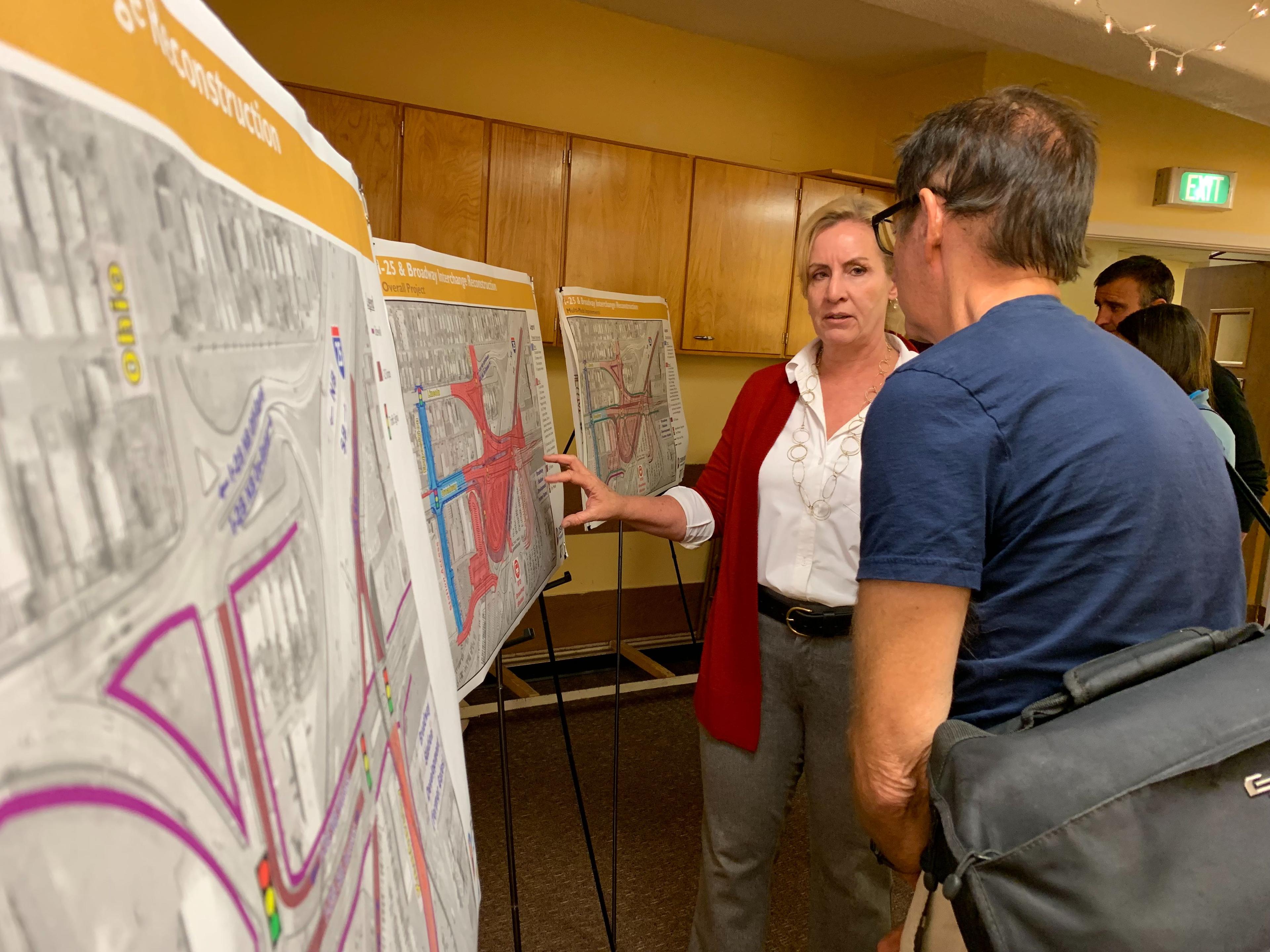Denver Public Works still plans on moving forward with a project meant to improve Interstate 25 access along Broadway despite a neighborhood group's outcry that the project could hurt a potential historic district bid in Washington Park West.
City staff on Monday evening hosted a meeting updating residents on the project, which seeks to improve access to and traffic on I-25 near Broadway by adding traffic signals and reconfiguring southbound access by building a new ramp.
It's also meant to improve RTDs speed and reliability while adding new sidewalks and fixing up the current ones to allow better pedestrian access to RTD's I-25 & Broadway Station. The city hopes the entire project improves overall safety and reduces crashes along the busy corridor.
But a point of contention from the project's first phase has surfaced.
Right now, the city wants to expand Exposition Avenue to allow more access to the RTD station. The city is proposing widening the street from 60 feet to 62 feet between Lincoln and Broadway. The extra space would allow for a reconfiguration that creates two travel lanes, as well as a parking lane on one side of the street and a turning lane in the other. West Washington Park Neighborhood Association board vice president board Sarah McCarthy said for most people, this will extend about 18 inches or less into their front yards.
Both sides of the street would have 5-foot sidewalks next to 5-foot tree lawns and roughly 2-foot gutters. The city is proposing extending Exposition westward through to Bannock Street, which would require additional construction and building over an existing parking lot.
The West Washington Park Neighborhood Association is opposing the expansion. They argue widening Exposition turns the residential street into an arterial street and potentially affects the area's eligibility as a historic district. It will especially impact homes near Lincoln Street and Ohio Avenue, according to McCarthy.
The neighborhood association sent a letter to the city saying the changes would have an adverse effect last month after the city had initially proposed widening the street to 66 feet. Monday's meeting was a chance for the city to come back to residents and offer a new plan, which included a reduced proposed street length. The city is hoping to get a new letter from the neighborhood association supporting the new plan.
A spokesperson for the city's Community Planning and Development office said no application for a historic district in the area has so far been submitted.

City Project Manager Gabriella Serrado said the project has been in the works since 2008, though funding wasn't allocated until more recently.
The city has received $65 million from the Federal Highway Administration for the project.
While Serrado said on Monday they are seeking a letter of approval from the RNO to move the project forward, an email from Denver Public Works spokesperson Nancy Kuhn said, "If the city doesn't get the RNO support letter, we'll continue working with CDOT and FHWA on next steps." Kuhn said in the email that the neighborhood association was a consulting party during the original environmental assessment completed more than a decade ago. As a result, Kuhn said, they were allowed to weigh-in on the re-evaluation that took place this year.
"They have a right to review the project again ... they were a stakeholder," Serrado said.
McCarthy declined to say how she plans on voting this week but said she'll be taking everything she learned from Monday's meeting back to the board to make an official decision. She feels the city has not been communicative enough throughout the process.
"We need to speak as one voice when we speak," McCarthy said of the board.
CDOT is acting as an intermediary between the city and the Federal Highway Administration. CDOT Senior Historian Barbara Stocklin-Steely told residents on Monday that CDOT concluded in July that the project wouldn't have any adverse effect on a potential historic district in Washington Park West. That determination was agreed upon by the State Historic Preservation Office.
Residents worry the expansion will lead to more traffic along residential streets and increase air pollution.
Some just hope the project ends up looking good.
Among the more contentious potential project additions is the addition of a bike lane to Exposition, which the city said would require eliminating the parking lane. It was the subject of chatter online from residents who believe there simply isn't enough space on the street, while others are hoping to see bike lanes on Broadway extended further.
Neighborhood resident Richard Swanson doesn't think the parking lane will even be wide enough for most cars. He does think improvements are needed in the area, but his chief concern is how Exposition will change.
"I think it's a negative impact to the neighborhood, overall," Swanson said. "The change in traffic flows and bringing more people into the neighborhood."














